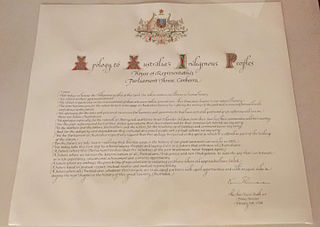
A moral panic is a widespread feeling of fear that some evil person or thing threatens the values, interests, or well-being of a community or society. It is "the process of arousing social concern over an issue", usually perpetuated by moral entrepreneurs and mass media coverage, and exacerbated by politicians and lawmakers. Moral panic can give rise to new laws aimed at controlling the community.

Honour or honor is a quality of a person that is of both social teaching and personal ethos, that manifests itself as a code of conduct, and has various elements such as valour, chivalry, honesty, and compassion. It is an abstract concept entailing a perceived quality of worthiness and respectability that affects both the social standing and the self-evaluation of an individual or of institutions such as a family, school, regiment, or nation. Accordingly, individuals are assigned worth and stature based on the harmony of their actions with a specific code of honour, and with the moral code of the society at large.

Crime statistics refer to systematic, quantitative results about crime, as opposed to crime news or anecdotes. Notably, crime statistics can be the result of two rather different processes:

Retributive justice is a legal concept whereby the criminal offender receives punishment proportional or similar to the crime. As opposed to revenge, retribution—and thus retributive justice—is not personal, is directed only at wrongdoing, has inherent limits, involves no pleasure at the suffering of others, and employs procedural standards. Retributive justice contrasts with other purposes of punishment such as deterrence, exile and rehabilitation of the offender.

Restorative justice is an approach to justice that aims to repair the harm done to victims. In doing so, practitioners work to ensure that offenders take responsibility for their actions, to understand the harm they have caused, to give them an opportunity to redeem themselves, and to discourage them from causing further harm. For victims, the goal is to give them an active role in the process, and to reduce feelings of anxiety and powerlessness. Restorative justice programs can also complement traditional methods, such as retributive justice, and it has been argued that some cases of restorative justice constitute punishment from the perspectives of some positions on what punishment is.
Victim blaming occurs when the victim of a crime or any wrongful act is held entirely or partially at fault for the harm that befell them. There is historical and current prejudice against the victims of domestic violence and sex crimes, such as the greater tendency to blame victims of rape than victims of robbery if victims and perpetrators knew each other prior to the commission of the crime. The Gay Panic Defense has also been used to justify violence against LGBTQ people.
Articles related to criminology and law enforcement.
Like rational choice theory, conflict theory, or functionalism, pure sociology is a sociological paradigm — a strategy for explaining human behavior. Developed by Donald Black as an alternative to individualistic and social-psychological theories, pure sociology was initially used to explain variation in legal behavior. Since then, Black and other pure sociologists have used the strategy to explain terrorism, genocide, lynching, and other forms of conflict management as well as science, art, and religion.
Lewis Alfred Coser was a German-American sociologist, serving as the 66th president of the American Sociological Association in 1975.

An apology is a voluntary expression of regret or remorse for actions, while apologizing is the act of expressing regret or remorse. In informal situations, it may be called saying sorry. The goal of an apology is generally forgiveness, reconciliation, and restoration of the relationship between the people involved in a dispute.

The sociology of punishment seeks to understand why and how we punish. Punishment involves the intentional infliction of pain and/or the deprivation of rights and liberties. Sociologists of punishment usually examine state-sanctioned acts in relation to law-breaking; for instance, why citizens give consent to the legitimation of acts of violence.
Techniques of neutralization are a theoretical series of methods by which those who commit illegitimate acts temporarily neutralize certain values within themselves which would normally prohibit them from carrying out such acts, such as morality, obligation to abide by the law, and so on. In simpler terms, it is a psychological method for people to turn off "inner protests" when they do, or are about to do something they themselves perceive as wrong.
Microaggression is a term used for commonplace verbal, behavioral or environmental slights, whether intentional or unintentional, that communicate hostile, derogatory, or negative attitudes toward those of different races, cultures, beliefs, or genders. The term was coined by Harvard University psychiatrist Chester M. Pierce in 1970 to describe insults and dismissals which he regularly witnessed non-black Americans inflicting on African Americans. By the early 21st century, use of the term was applied to the casual disparagement of any socially marginalized group, including LGBT people, poor people, and disabled people. Psychologist Derald Wing Sue defines microaggressions as "brief, everyday exchanges that send denigrating messages to certain individuals because of their group membership". The persons making the comments may be otherwise well-intentioned and unaware of the potential impact of their words.

Outrage is a strong moral emotion characterized by a combination of surprise, disgust, and anger, usually in reaction to a grave personal offense. It comes from old French "ultrage", which in turn borrows from classical Latin "ultra", meaning "beyond".
Victim mentality is a psychological concept referring to a mindset in which a person, or group of people, tends to recognize or consider themselves a victim of the negative actions of others. In some cases, those with a victim mentality have in fact been the victim of wrongdoing by others or have otherwise suffered misfortune through no fault of their own. The term is also used in reference to the tendency for blaming one's misfortunes on somebody else's misdeeds, which is also referred to as victimism.
Quillette is an online magazine founded by Australian journalist Claire Lehmann. The magazine primarily focuses on science, technology, news, culture, and politics.
Lilie Chouliaraki is Chair in Media and Communications at the London School of Economics and Political Sciences (LSE). Chouliaraki’s main area of research is the mediation of human vulnerability and suffering. Her publications have pioneered an interdisciplinary research field in Media and Communications Ethics, focusing on three areas of research:
Alyson M. Cole is an American political scientist. She is a professor of Political Science, Women's and Gender Studies, and American Studies at Queens College, City University of New York and the CUNY Graduate Center, where she has also served as the Executive Officer of the political science program. Cole studies political philosophy and American culture, and has published works on the politics of victimhood and vulnerability in America, the politics of gender equality, and the nature of capitalism as a way of life.
The politics of resentment, sometimes called grievance politics, is a form of politics which is based on resentment of some other group of people.
A purity spiral is a theory which argues for the existence of a form of groupthink in which it becomes more beneficial to hold certain views than to not hold them, and more extreme views are rewarded while expressing doubt, nuance, or moderation is punished. It is argued that this feedback loop leads to members competing to demonstrate the zealotry or purity of their views.







